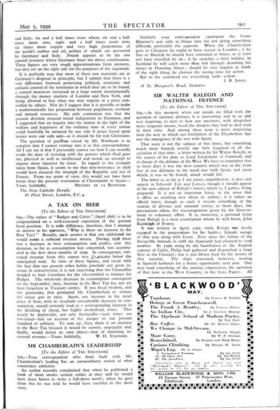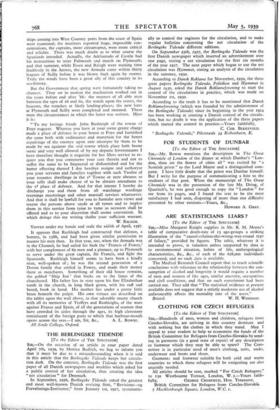SIR .WALTER RALEGH AND NATIONAL DEFENCE [To the Editor of
THE SPECTATOR]
Sul,—At this moment when our minds are filled with the question of national defence, it is interesting, and in an odd way inspiring, to turn to how our ancestors, with altogether more exiguous means, faced the dangers they had to deal with in their time. And among these none is more inspiriting than the way in which our forefathers of the Elizabethan Agc met the emergency of the war with Spain.
That story is not the subject of this letter, but something much more limited, merely one little fragment of all the agitation of that time: a letter written by Sir Walter Ralegh, in the course of his duty as Lord Lieutenant of Cornwall, and in charge of the defence of the West. We have to remember that in those days it was the west country which was in the front line of our defences in the naval war with Spain, and upon which, it was to be feared, attack would fall.
The letter is, so far as I am aware, unpublished ; it does not appear in Edwards' Life and Letters, though it should appear in the new edition of Ralegh's letters, which is, I gather, being prepared. It is not an important letter, in the sense that it offers us anything new about its author ; it is rather an official letter, though as such it reveals something of the routine of defence and national service in those days, the precautions taken, the encouragement given by the Govern- ment to voluntary effort. It is, moreover, a personal letter from Ralegh to a west countryman whom he well knew, John Rashleigh of Fowey.
It was written in April, 1597, while Ralegh was busily engaged in the preparations for his luckless Islands voyage of that year along with Essex. Ever since the failure of the Invincible Armada in 1588 the Spaniards had planned to send another. In 1596, stung by the humiliation of the English capture of Cadiz, Philip had gathered and dispatched a large fleet to the Channel ; but it was blown back by the storms of that autumn. The ships remained, however, waiting in Spanish harbours for a better opportunity next year. One may read something of the anxious expectation, the agitation of that time in the West Country, in the State Papers. All ships coming into West Country ports from the coast of Spain were examined; the mariners reported huge, impossible con- centrations, the captains, more circumspect, were more critical and reliable. There was much doubt as to what course the Spaniards intended. Actually, the Adelantado of Castile had his instructions to seize Falmouth and march on Plymouth; and that summer, while Essex and Ralegh were wasting time fruitlessly in the Azores, the new Armada came within thirty leagues of Scilly before it was blown back again by storms. Truly the winds have been a great ally of this country in its sea-history.
But the Government that spring were fortunately taking no chances. They set in motion the mechanism worked out in the years before and after '88: the musters of all able men between the ages of 16 and 6o, the watch upon the coasts, the beacons, the trenches at likely landing-places; the new forts at Plymouth and Scilly were completed and manned. These were the circumstances in which the letter was written. Here it is : " To my lovinge frinde John Rashleigh of the towne of Foye esquyer. Whereas you have at your owne greate charge made a place of defence in your house at Foye and furnished the same both with ordinaunce and munytion for the better repulsinge of the enemye upon anie attempte by them to be made by sea againste the said towne which place hath beene seene and very well allowed of by my deputie leivetenaunts I have therefore thought it requisite for her Mats service to re- quire you that you contynewe your care therein and not to suffer the same to be Impayred or disfurnished and for the better effecting thereof I doe herebye assigne and authoryse you your servants and famylies togither with such Twelve of your tenantes dwellinge in the sd Towne or nere aboutes as your selfe shall make choyse of to be alwaies attendante to the Sd place of defence. And for that intente I hereby do discharge you and them from all watchinge wardinge trayninge musteringe and other marsiall services whatsoever. And that it shall be lawfull for you to furnishe arm viewe and trayne the persons above sayde at all tymes and to imploy them in this service from tyme to tyme as occasion shall be offered and as to your discretion shall seeme convenient. In which doinge this my writing shalbe your sufficient warrant.
W. RALEGH.
Yeoven under my hande and seale the xiiiith of April, 1597.
It appears that Rashleigh had constructed that defence, a battery, in 1588, and had been given similar permission to muster his men then. In that year, too, when the Armada was in the Channel, he had sailed his bark the ' Francis of Fowey,' with her complement of 6o men and a pinnace, up to Plymouth to serve under the great captain, Sir Francis, and fight the Spaniards. Rashleigh himself seems to have been a kindly man, well-spoken of ; he was the second generation of a Devon family that settled in Fowey, and made their money there as merchants. Something of their old house remains, the gabled `Ship Inn' that backs on to the limes of the churchyard. His father lies in state upon his fine Elizabethan tomb in the church, in long black gown, with his ruff and beard, book in hand. His mother lies under a pretty little brass beneath the pulpit. His own virtues are described on the tablet upon the wall above, in that adorable musty church with all its memories of Treffrys and Rashleighs, of the wars against France and Spain, of all the generations of seamen that have crowded its aisles through the ages, its high clerestory reminiscent of the foreign parts to which that harbour-mouth















































 Previous page
Previous page